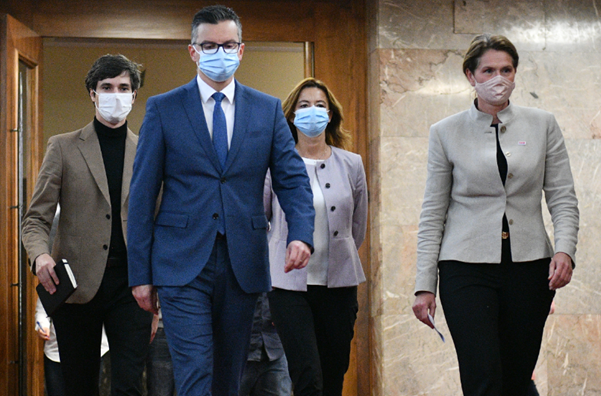“What are the professional grounds for the fact that Slovenian schools have been closed for a record-long time?” the SD party wondered. “We were one of the first countries in Europe to close our schools and have insisted on this closure for the longest time in the area,” said the Levica MP Matej Vatovec during the interpellation of Minister Kustec. It was already known at the time that the left-wing opposition was constantly misleading about the closure of schools and even filed interpellations against the Minister of Education. Now that the official data is known, will they apologise to the public and Minister Simona Kustec?
In mid-March, we witnessed the interpellation of the Minister of Education, Science and Sport, Simona Kustec, because according to the Constitutional Arch Coalition quartet, schools in Slovenia were closed for a record long time, compared to other countries in Europe. In the LMŠ, so the party whose president gave up on leading the country during the most difficult time, they accused the Minister of the following, among other things: “When those who she represents, or should represent, called for solutions, the Minister spoke of three main things: knowledge, health, trust. But in reality, the three main things were closure, closure, closure.”
The SD party critically wondered about the professional grounds for the closure of Slovenian schools for a record long time. “Slovenian children have been staying at home and distance learning for the longest period of time among all of the children in the European Union, as in some countries, schools were not closed at all, despite the fact that other activities were subject to strict restrictions,” they said. The Levica party was also very critical of the Minister. MP Matej Tašner Vatovec accusingly pointed out the following at the interpellation: “We were one of the first countries in Europe to close our schools and have insisted on this closure for the longest time in the area.”
Statistical data speaks for itself
Statistical data speaks for itself. If we look at the data, we can see that the schools in Slovenia were closed for 154 days. In Ireland, schools were closed for 163 days, in the Czech Republic for 166 days, in Poland for 171 days, in Hungary for 180 days, in Slovakia for 181 days, in Romania for 195 days, in Germany for 227 days, and in Italy for 249 days. As can be seen from the data, the schools in Denmark were the only ones that were closed for a shorter period of time than schools in Slovenia. However, all around the world, the importance of closing the schools, and thus restricting contact, was also recognised. In other parts of the world, schools were closed even longer – in the US, they were closed for 308 days, and in Canada for 336 days.
Based on completely fabricated claims, the opposition even filed an interpellation
The claim that schools in Slovenia have been closed for the longest time among all of the schools in Europe is completely fabricated, and politicians of the left-wing opposition deliberately misled the public with these statements. Given the position advocated by the opposition in the interpellation, it is clear that they would have reopened the schools much sooner, despite the fact that the medical profession around the world was unanimous in its claim that the closure of school makes an important contribution to reducing contact and thus reducing the transmission of the virus. So much for repeating the mantra that it is necessary to listen to the medical profession. The left-wing opposition itself has already proven in the past how much they actually care about it. The SD party, for example, was in favour of schools without masks, despite the clear position of the medical profession. Given that this has also contributed to the growth in the number of infections, it would be appropriate for the profession to continue to have the main say when it comes to answering health-related questions.
The aforementioned statistical data further proves that the opposition’s allegations, expressed in the form of serial interpellations, only had one goal, and that is the overthrowing of the government. Since they failed to do that, they decided to go after the government in other ways as well, and we often see them on the streets as part of Fridays’ protests. Some find it difficult to understand that in democratic societies, it is normal for the people in power to change.
Nina Žoher


